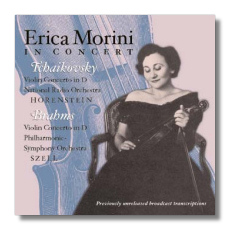
The Internet's Premier Classical Music Source
Related Links
- Latest Reviews
- More Reviews
-
By Composer
-
Collections
DVD & Blu-ray
Books
Concert Reviews
Articles/Interviews
Software
Audio
Search Amazon
Recommended Links
Site News
 CD Review
CD Review
Erica Morini

In Concert
- Piotr Ilyitch Tchaikovsky: Violin Concerto, Op. 35
- Johannes Brahms: Violin Concerto, Op. 77
Erica Morini, violin
"National Radio Orchestra"/Jascha Horenstein
"Philharmonic-Symphony Orchestra"/George Szell
Music & Arts CD-1116 AAD monaural 67:58
Perhaps because female violin virtuosos tended to be accepted less than males until recently, there are a handful of them who have attained cult status, and whose recordings, no matter what their source, are very highly prized. Guila Bustabo comes immediately to mind, as does Ginette Neveu, Ida Haendel, and also Erica Morini. Morini was born in Vienna in 1904, and received lessons from her violinist father at an early age. At seven, she began studies at the Vienna Conservatory with Otakar Sevcik, and then she studied with Rosa Hochmann. By the time she was twelve, she was performing with the Berlin Philharmonic and the Gewandhaus Orchestra Leipzigs.
Compared to her male colleagues, Morini made few commercial recordings. She did, however, record both the Tchaikovsky and Brahms concertos in the late 1950s for Westminster with Artur Rodzinski, and both of these have been reissued on CD. They're wonderful readings; the Tchaikovsky, in particular, is one of my favorites. These live broadcast transcriptions, "previously unreleased" according to Music & Arts, are more spontaneous – and obviously less polished! – and, arguably, they pair the violinist with more sympathetic conductors. (Nothing against Rodzinski, but it is hard to beat Szell in Brahms, and Horenstein's patrician Tchaikovsky isn't run of the mill either.)
The Tchaikovsky was recorded in Paris on December 19, 1957. As with Rodzinski, Morini plays with generous tone and full-hearted passion, yet there's a likeably "classical" air to her interpretation, a bias evidently shared by Horenstein. Through over-familiarity, it is easy to undervalue this concerto, yet Morini and Horenstein take nothing for granted, and we, the listeners, follow their example and come away realizing what great music this is. Maybe there is something new under the sun, after all. The standard cuts in the third movement are taken, unfortunately.
Carnegie Hall was the venue for Morini's Brahms Concerto; the date was December 14, 1952. Compared to Rodzinski, Szell was a bag of adrenaline on this occasion, and his reading is taut and tough. Morini is in very good form here (slightly more assured than in the Tchaikovsky), and again, her ability to convey emotion without stylistic excess serves her well. One violinist to whom she has been compared is Fritz Kreisler, but not even Kreisler had consistent access to Morini's level of musical intelligence. On occasion I might prefer a reading less plush and warm than Morini's, but there's nothing about her Brahms that is less than first-class.
The source material has been prepared for CD by Maggi Payne. The Paris broadcast sounds better, with very little to get in the way of the music-making. The New York broadcast is more peaky and distorted, and the source material is noisier. Still, the musicianship conquers all that. The CD booklet contains a good essay by Allan Evans.
In October 1995, as Morini lay dying in her hospital bed, her priceless Stradivarius was stolen from her apartment, as were scores, letters, and recordings. (Obviously the thief had excellent taste.) What a sad postscript to the life of such a great virtuoso! Fortunately, through labels such as Music & Arts, it is possible for everyone to experience Morini as she was at her peak.
Copyright © 2003, Raymond Tuttle


















